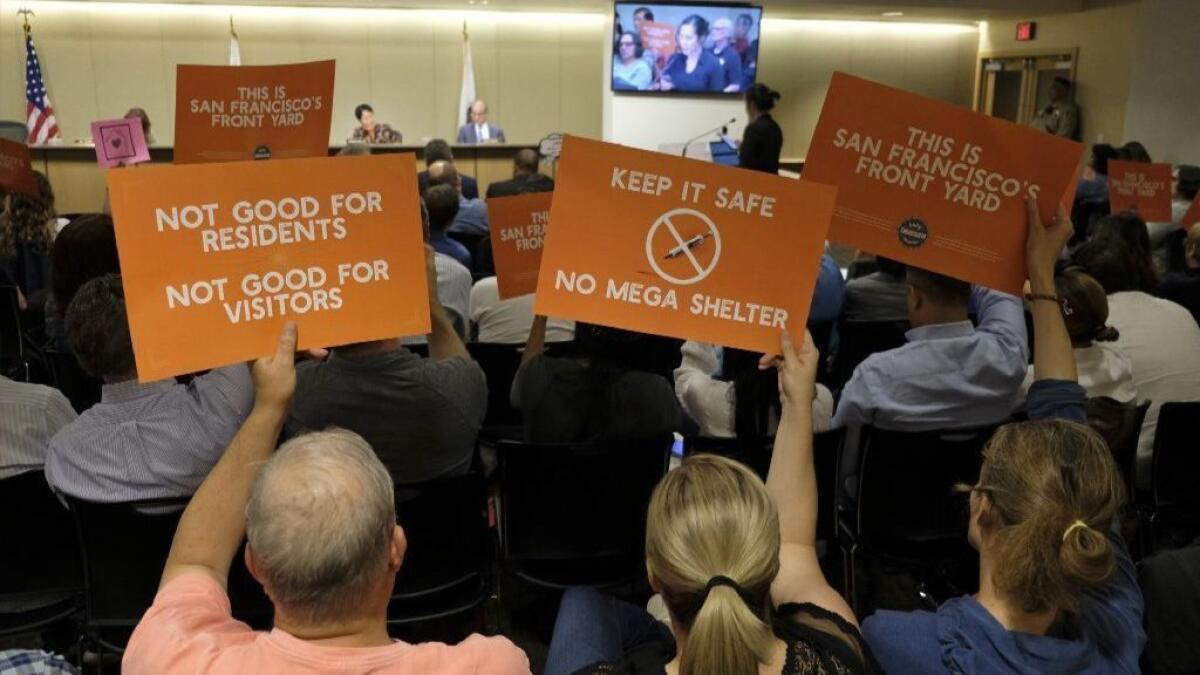To block homeless shelter, San Francisco residents are suing on environmental grounds

- Share via
A group of San Francisco residents filed a lawsuit Wednesday to block construction of a 200-bed temporary homeless shelter, another instance of the state’s environmental laws being used to derail such projects.
The coalition, Safe Embarcadero for All, had been threatening for months to bring the case as the planned homeless shelter, proposed for a parking lot on the Embarcadero, wound its way through the approval process. They raised at least $100,000 and organized robust protests at city meetings since Mayor London Breed first proposed it in March.
The San Francisco Port Commission approved the project in April, and the city will have a two-year lease on the site and pay about $37,000.
Attorneys for the group — Safe Embarcadero for All — filed the case in Sacramento Superior Court. They argue that the city didn’t gain approval for the project from the State Lands Commission, which has oversight over waterfront development, and is the lead defendant. A spokesperson for the commission declined to comment, citing pending litigation.
The site is near the Ferry Building and where the San Francisco Giants stadium is located.
“There’s no question that there is a big problem in the city,” said Peter Prows, one of the attorneys on the case. “But the homelessness problem has to be solved in compliance with the law and that’s what the city is not doing here.” Attorneys for the Embarcadero neighbors also ask that construction on the project be halted until the case has been adjudicated. Prows said a judge could hear their petition for an injunction as early as this week.
Opponents of the proposed shelter are also arguing the project didn’t go through a full environmental review process. The California Environmental Quality Act, or CEQA, requires developers to show the environmental effects a project might have and take steps to reduce them.
The city and county argued that the project was exempt from CEQA. Attorneys and opponents of the project say that more homeless people will impact the environment.
“This project will have a significant effect on the environment due to these unusual circumstances, including by attracting additional homeless persons, open drug and alcohol use, crime, daily emergency calls, public urination and defecation and other nuisances,” the lawsuit states.
The suit comes amid wide debate over homeowners using these environmental laws to derail homeless shelters and affordable housing projects. Opponents say such projects can harm neighborhoods and argue that state law was designed to help residents avoid or mitigate potential harm. But homeless and housing advocates say these litigants are abusing laws intended for true environmental purposes, and perpetuating stereotypes about the homeless in the process.
“Who’s the real menace in the neighborhood?” local resident Allen Cooper told the Times earlier this year. “It’s the drunk Giants fans.”
“If you’re going to tear down parts of Sequoia National Park to build a homeless shelter, I would probably be against that. But right here,” he said, gesturing to the parking lot. “Ridiculous.”
John Coté, a spokesman for the City Attorney Dennis Herrera, said that their office was reviewing the proposed shelter lawsuit and that they “would address its specific allegations in court.” He noted that the Port Commission has approved the proposed construction project and that the County Board of Supervisors has denied several CEQA appeals.
“San Francisco has a homeless crisis on its hands. The city is ready to put roofs over people’s heads and get them indoors,” Coté said. “Others are filing baseless lawsuits to keep people out in the cold. Rather than trying to shift the problem to someone else’s backyard, everyone needs to do their part.”
This is not the first time local residents in California have gone to court to try and block the building of a shelter. In Los Angeles, Venice residents have raised more than $200,000 to sue the city after it approved a plan to construct a temporary 154-bed shelter at a former Metropolitan Transit Authority bus yard on Sunset Avenue. The shelter is part of Mayor Eric Garcetti’s pledge to open a facility in each of the city’s 15 council districts.
They also argued that the city circumvented CEQA, and a Los Angeles County Superior Court judge recently ruled that this case could proceed. It will likely be heard this fall.
Times staff writer Liam Dillon contributed to this report.
More to Read
Sign up for Essential California
The most important California stories and recommendations in your inbox every morning.
You may occasionally receive promotional content from the Los Angeles Times.











